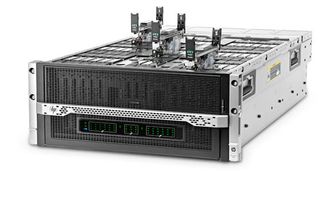Intel Atom SoC to Power HP's Moonshot Servers in 2013
The first two generations of HP’s new “ultra energy-efficient” server architectures will be powered by Intel Atom processors.

HP’s ProLiant Moonshot server is the company’s new “ultra energy-efficient” server architecture that is billed as the first “software defined server to run internet scale applications.” Though HP initially planned to utilize Calxeda-based ARM processors, it has now been announced that at least the first two generations of Moonshot servers will be powered by Intel Atom processors, initially by S1200 chips and then by the upcoming Avonton SoC, which will be built on Intel’s new 3D Trigate 22 nm process technology and based on the “Silvermont” microarchitecture.
The Avoton processors will feature an integrated Ethernet fabric controller and deliver improvements in performance per watt and energy efficiency over the Atom S1200. The Avoton SoC is current being “sampled to customers” and is scheduled for a Q2 2013 release.
In a posting on Intel’s Data Stack blog, Raejeanne Skillen elaborated on the reasoning behind HP’s decision to adopt Atom processors:
“First, HP and Intel have a long history of collaboration and we have brought many innovations to market first on Intel and HP’s platforms. Second, the Intel Atom S1200 processor is the industry’s only available 64-bit SoC with critical data centre class features such as full 64-bit software ecosystem support, ECC and Intel Virtualization Technology - all within an ultra-low power 6W TDP.
Third, this SoC was designed for targeted lightweight web scale workloads, including low-end dedicated hosting, simple content delivery, and offline batch analytics making Intel Atom S1200 the perfect SoC solution for HP Moonshot’s target markets.”

The HP Proliant Moonshot server is available today in a 4.3U server enclosure that supports up to 1,800 servers per 47U rack and is the industry’s first 6 W server. Moonshot’s biggest selling point is its promise of delivering “less energy use, less space, less cost” and to that end the servers are advertised as consuming 89 percent less energy, 80 percent less space with 77 percent less cost and 97 percent less complexity than traditional servers. It is worth noting that HP hasn’t specified which “traditional server” they used to make this comparison.
“With nearly 10 billion devices connected to the internet and predictions for exponential growth, we’ve reached a point where the space, power, and cost demands of traditional technology are no longer sustainable. HP Moonshot marks the beginning of a new style of IT that will change the infrastructure economics and lay the foundation for the next 20 billion devices.”
Stay on the Cutting Edge
Join the experts who read Tom's Hardware for the inside track on enthusiast PC tech news — and have for over 25 years. We'll send breaking news and in-depth reviews of CPUs, GPUs, AI, maker hardware and more straight to your inbox.
-
dalethepcman "97 percent less complexity"Reply
and 100% made up numbers... 97% less complex than a server is an abacus, 98% is sand + stick, 99% is fingers.
That being said, I wonder what the performance of an 1800 core rack would be like for a new Citrix farm... -
ojas Waiting for the anti-Intel trolls to come up with something...surely ARM is more efficient and they could have just glued two 32-bit SoCs to get a 64-bit one? :PReply
Most Popular



